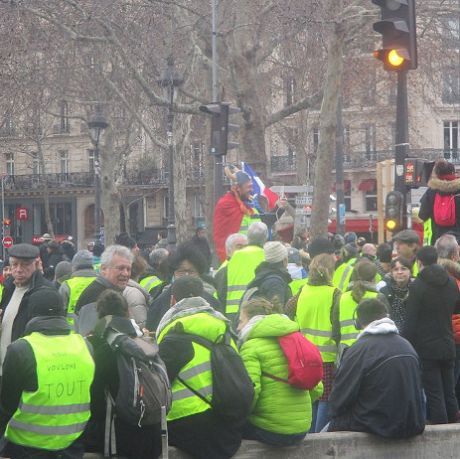Features
You are here
“Capitalist dinosaurs, tremble, the world will change”

March 6, 2019
The Yellow Vests (Gilets jaunes) movement in France has been raging for four months now, since November of last year. What initially started out as a protest against rising fuel prices has expanded into a movement calling into question the government of Macron and capitalism itself.
Students and youth have become an important presence and big supporters of the Yellow Vests. A school student in Bordeaux explained why many French youth are supporting the Yellow Vest movement, “We see our parents work very hard but get almost nothing. We want more than that when we see the rich take more and more. We want free education for all at every level and a life that is human, not reduced to a machine for profit.”
There have been attempts by the far right in France to hijack the movement. The fascist Marine Le Pen has posed as its champion, but her message of division and racism has been largely rejected.
This is because of the broad-based nature of the opposition to this point, which has become a revolt of French workers and students against the venality of all politicians.
A rail worker who came to Paris with his work mates to participate in the mobilisations described it this way: "I came to see if this was a real working class movement of the sort I could support. It was brilliant, we all thought so. We were all involved in the rail strikes earlier this year. They were good but they didn’t go far enough. Now I feel we can bring Macron down.”
What is happening in France – the polarization between left and right and the failure of the centre (mainstream, 'reasonable' politicians) to hold – is a global phenomenon. The difference is that in France the class anger and bitterness has erupted on the streets and increasingly in the workplaces to challenge the status quo of a politician like Macron who originally was elected on a platform of being the 'saviour' of French capitalism and somehow also the friend of 'ordinary' French citizens.
In countries like Britain and Canada there have been recent attempts by the far right and fascists to claim the mantle of the Yellow Vests for their own racist purposes. They have been able to do this partially because there is no comparable movement on the streets but they have not gone without being challenged by anti-racists, Indigenous activists and others who see through their phony identification with a burgeoning anti-capitalist struggle in France.
In France, there is no central coordination of the Yellow Vest movement. In that sense it has similarities with Occupy, in terms of being a spontaneous eruption from below.
But the most popular demands of the movement are unifying ones: a big increase in taxation on the rich, more money for the services ordinary people need, the removal of Macron, and an end to privatization.
Of course, the mainstream media and the politicians take every opportunity to say that the movement is dying. They are being helped along by the repressive forces of the French state who have been arresting and physically attacking the demonstrations since the beginning.
However, just last week thousands were on the street in Toulouse, carrying placards such as “Fâché mais pas facho” (Angry but not fascist) and “capitalist dinosaurs, tremble, the world will change”.
The Yellow Vest movement has been inspiring fightbacks in other countries, such as Belgium and the Netherlands, where ordinary people face the same austerity and attacks.
Protesters in Iraq have been inspired to wear yellow vests on their own demonstrations. And in Egypt the regime of dictator Abdel Fattah el-Sisi restricted the sale of yellow vests ahead of the anniversary of the 2011 Egyptian Revolution.
There are two things that are critical for the movement in France to grow. One, the Yellow Vests must join up with organized workers, who have the power in their workplaces to make Macron and his capitalist cronies cower.
To a certain extent this has been happening over the last months. The government has tried to blame “ultra left and ultra right troublemakers” for the revolt. But the vast majority of those involved are ordinary people.
Right wing paper Le Figaro admitted that most of those arrested on the Yellow Vest protests have been “workers, mechanics, cooks, carpenters, farmers and plumbers, aged between 20 and 30”.
Strikes have been growing in regional transport, the energy sector, and even the administrative and technical section of the police.
And links with Yellow Vests are developing. The Sud-Rail union—the third biggest in the industry—has called explicitly for support of Yellow Vest protests.
France's main trade union federation – the CGT – has finally voiced support for the Yellow Vests. At first it was contemptuous of the movement, which began against rising fuel costs.
Now it says there is “legitimate anger in the population” and that “the CGT shares this anger”. But the CGT leaders have too often throttled real resistance so the movement must build it's own rank and file leadership that can carry the struggle forward if the union leadership waver and back down.
Secondly, the Yellow Vests must take a clear anti-racist position to withstand the scapegoating and racism that is being fomented by the ruling class in France to try and break the movement. In a recent television address Macron ominously called for something to be done about French people’s identity, about immigration and about so-called threats to secularism.
But united and more militant struggle can defeat all of Macron’s scheming and push for fundamental change.
Section:
Topics:










